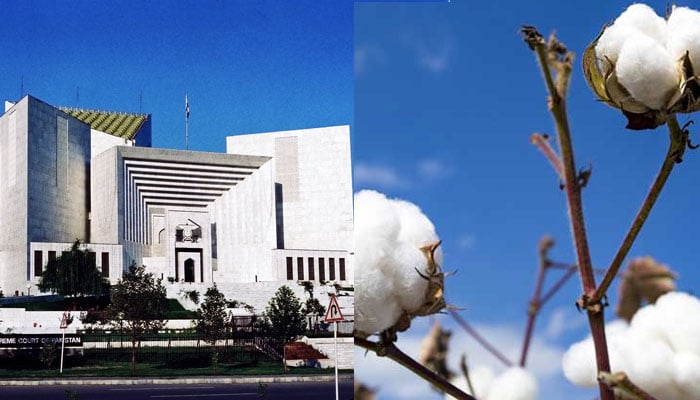Govt must prioritise cotton cultivation: Supreme Court
ISLAMABAD: The Supreme Court on Tuesday observed that instead of concentrating on cotton crop, sugarcane was being cultivated which consumed more water causing severe losses to the country.
A three-member bench, headed by Chief Justice of Pakistan Justice Gulzar Ahmed, heard a case concerning the use of water, its prices as well as implementation of recommendations forwarded by the Water Conference held by the Supreme Court in 2018.
The chief justice observed that despite being an agricultural country Pakistan had to import cotton, adding that instead of concentrating on cultivation of cotton, sugarcane was being cultivated which required more water causing severe losses to the country.
He further observed that growers cultivate sugarcane fearing that if they don’t, sugar mills owner will take over their lands.
“There is no system available in our country regarding crop cultivation,” the CJP remarked adding that preference should be given to those crops which consumed less water. The court expressed annoyance over the Sindh government’s failure in submitting its report.
The chief justice remarked that all the provinces except Sindh had submitted their reports and the court was about to close the case that was being tried since 2018. He chief justice asked as to why the Sindh province always lagged behind. The Sindh government representative informed the court that 64 dams had been constructed.
The chief justice asked as to who was barring the Sindh government from constructing the Nai Gaj dam. Deputy Secretary Irrigation Sindh admitted corruption in the construction of Nai Gaj dam and informed the court that an approval had been sought for taking action against those responsible.
The chief justice asked if the Sindh chief minister will allow the anti-corruption department to take action in this regard. Deputy secretary irrigation submitted that an inquiry had also been initiated on the orders of chief minister.
The chief justice observed that Mancher Lake in Sindh was the biggest in Pakistan but it was being filled with dirty water. “Despite having the biggest reservoir in Sindh, its people are facing scarcity of water,” he further observed.
The court was informed that Rs200 was being charged per crop for water in Sindh. The chief justice, however, observed that the income of one crop was in crores, while only Rs200 was charged for water.
Justice Ijazul Ahsen asked about the water tariff which was to be introduced for cement, textiles as well as leather industries. The judge asked under which rule government departments will collect water tariff.
A representative of Pakistan Commission for Indus Water told the court that they had submitted their recommendations and intimated the provinces about the price to be collected for water.
The court was further informed that the amount fixed for the water was less than that was fixed by the US. Similarly, the court was informed that the Terms of References (TORs) had also been prepared.
The court was informed that the Punjab government had submitted its report in this regard. Additional Advocate General told the court that Punjab was the only province which had started work on 115 kilometers new cannel which will irrigate around 1,70, 000 acres of land. He further said the Rs45 billion project was funded by the Asian Development Bank.
Meanwhile, the court adjourned the hearing for one month after giving time to all the four provinces and the federal capital to submit comprehensive reports on implementation of recommendations given by the Water Symposium.
-
 Pistons Vs Hornets Recap: Brawl Erupts With 4 Players Getting Tossed Before Detroit Victory
Pistons Vs Hornets Recap: Brawl Erupts With 4 Players Getting Tossed Before Detroit Victory -
 Gordie Howe Bridge Faces Uncertainty After Trump Warning To Canada
Gordie Howe Bridge Faces Uncertainty After Trump Warning To Canada -
 Air Canada’s Flights To Cuba Halted As As Aviation Fuel Crisis Worsens
Air Canada’s Flights To Cuba Halted As As Aviation Fuel Crisis Worsens -
 Marc Anthony Weighs In On Beckham Family Rift
Marc Anthony Weighs In On Beckham Family Rift -
 New Guest Host Announced For The Kelly Clarkson Show
New Guest Host Announced For The Kelly Clarkson Show -
 Why Prince William’s Statement Over Jeffrey Epstein ‘says A Lot’
Why Prince William’s Statement Over Jeffrey Epstein ‘says A Lot’ -
 Paul McCrane Reveals Why Playing Jerks Became His Calling Card
Paul McCrane Reveals Why Playing Jerks Became His Calling Card -
 Prince William, Kate Middleton Thrashed For Their ‘bland’ Epstein Statement
Prince William, Kate Middleton Thrashed For Their ‘bland’ Epstein Statement -
 Bad Bunny Stunned Jennifer Grey So Much She Named Dog After Him
Bad Bunny Stunned Jennifer Grey So Much She Named Dog After Him -
 Kim Kardashian's Plans With Lewis Hamilton After Super Bowl Meet-up
Kim Kardashian's Plans With Lewis Hamilton After Super Bowl Meet-up -
 Prince William Traumatised By ‘bizarre Image’ Uncle Andrew Has Brought For Royals
Prince William Traumatised By ‘bizarre Image’ Uncle Andrew Has Brought For Royals -
 David Thewlis Gets Candid About Remus Lupin Fans In 'Harry Potter'
David Thewlis Gets Candid About Remus Lupin Fans In 'Harry Potter' -
 Cardi B And Stefon Diggs Spark Breakup Rumours After Super Bowl LX
Cardi B And Stefon Diggs Spark Breakup Rumours After Super Bowl LX -
 Alix Earle And Tom Brady’s Relationship Status Revealed After Cosy Super Bowl 2026 Outing
Alix Earle And Tom Brady’s Relationship Status Revealed After Cosy Super Bowl 2026 Outing -
 Why King Charles Has ‘no Choice’ Over Andrew Problem
Why King Charles Has ‘no Choice’ Over Andrew Problem -
 Shamed Andrew Wants ‘grand Coffin’ Despite Tainting Nation
Shamed Andrew Wants ‘grand Coffin’ Despite Tainting Nation




